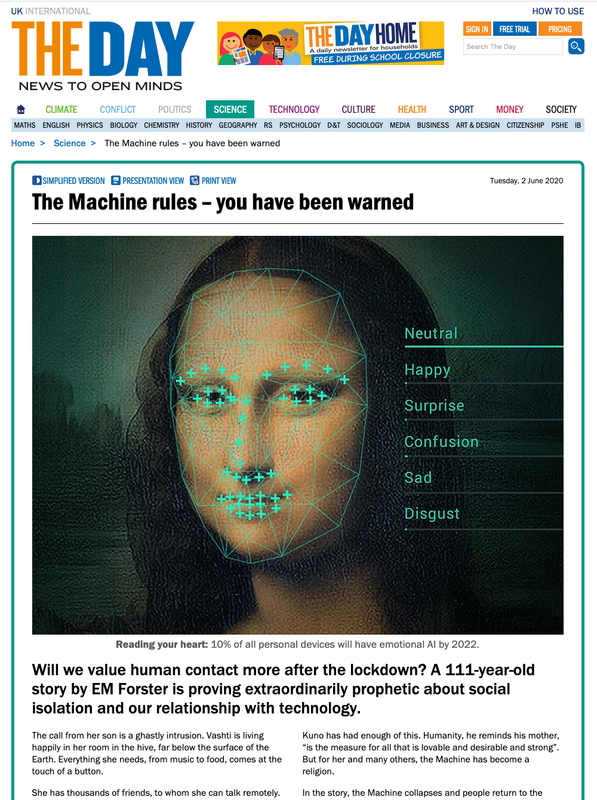Reply To: Year 9 FOSIL Inquiry Skills Project
Home › Forums › Inquiry and resource design › Year 9 FOSIL Inquiry Skills Project › Reply To: Year 9 FOSIL Inquiry Skills Project
Needing to redesign the Form 3 Inquiry Skills Project without reference to World War I – which means rethinking our choice of book – and in the uncertainty of what school might look like in September – which means rethinking our delivery – is both a challenge and an opportunity.
An aspect of the Connect phase that is often neglected, often due to time constraints, is background reading, and providing students with a book to read over the summer is an ideal way to extend this phase in a meaningful way. If the book is chosen well, there is a good chance that this reading will also be pleasurable. Logistical problems surrounding a physical book encouraged us to be inventive.
Lucy identified an excellent article in The Day, which we subscribe to, titled The Machine rules – you have been warned.

This article in particular has a number advantages:
- It asks a profound question – Will we value human contact more after the lockdown? – that lends itself to inquiry, which is “a dynamic process of being open to wonder and puzzlement and coming to know and understand the world, [and] as such, it is a stance that pervades all aspects of life and is essential to the way in which knowledge is created” (Galileo Educational Network). It is worth noting in this regard that the spirit of inquiry – as “a dynamic process of … coming to know and understand the world” – gave birth to the library and the library remains its natural home, even if it is not always welcome in the library. This, in turn, sheds light on the fundamental purpose of a school library, which is to enable understanding through reading in the broadest possible sense of the word. This, I think, is also why the excellent Ideal libraries: A guide for schools says that “libraries are where most forms of inquiry, not just academic ones, begin … libraries are more often than not where learners begin inquiry, either by design or their needs.”
- It does so through the lens of science fiction short story by E. M. Forster – The Machine Stops – a genre science fiction author Kim Stanley Robinson refers to as the literature of our time, and from which it derives its power, which is to reflect on the present from the safety of the future. Of The Machine Stops, Will Gompertz (Arts editor at the BBC) recently wrote: “[It] is not simply prescient; it is a jaw-droppingly, gob-smackingly, breath-takingly accurate literary description of lockdown life in 2020. If it had been written today it would be excellent, that it was written over a century ago is astonishing.”
- It is available online for free, but may be printed for offline reading if a subscriber.
- It is (short 1 page), accessible to a wide range of ability and rich in thought-provoking links (including the BBC article by Will Gompertz above and the full text of The Machine Stops below).
- It links to a full text version of The Machine Stops, which is freely available online as a PDF. The story, which should be optional, would stretch the intellectually curious and ambitious, although there are numerous audio versions that are freely available online, such as this BBC dramatization (44m12s), which should make the story itself accessible to a wider range of ability.
- With the shift in focus to science fiction, it will also be interesting to see what those Year 9 students who have come up from our Years 7 and 8 are able to draw on during the Connect phase, given that they will have undertaken the Year 7 English Inquiry – Science Fictional Writing.
As the purpose of the FOSIL ISP is not just to give our Year 9 students an opportunity to inquire, which would be like letting them swim with the fishes, but to make them more effective inquirers, delivery of the ISP also needs to take into account the demands of progressively and systematically developing the underlying skillset (see previous posts).
Barbara Stripling, who led the development of the Empire State Information Fluency Continuum that FOSIL is based on, powerfully describes what we are trying to achieve:
[Enabling] student-driven, active inquiry where learners are motivated to find out about something that interests them by asking authentic questions, investigating multiple and diverse sources to find answers, making sense of the information to construct new understandings, drawing conclusions and forming opinions based on the evidence, and sharing their new understandings with others. Inquiry is about developing personal meaning connected to prior knowledge, not accumulating information or adopting someone else’s knowledge. That is the dream but not the reality for most children in our educational system. … Providing a framework of the inquiry process is only the first step in empowering students to pursue inquiry on their own. The next step is to structure teaching around a framework of literacy, inquiry, critical thinking, and technology skills they must develop at each phase of inquiry over their years of school and in the context of content area learning.
Bibliography
International Baccalaureate Organization. (2018). Ideal libraries: A guide for schools. Cardiff: International Baccalaureate Organization.
Robinson, K. S. (2008, November 15). Opinion. New Scientist, p. 48.
Stripling, B. (2017). Empowering Students to Inquire in a Digital Environment. In S. W. Alman (Ed.), School librarianship : past, present, and future (pp. 51-63). Lanham: Rowman & Littlefield.


